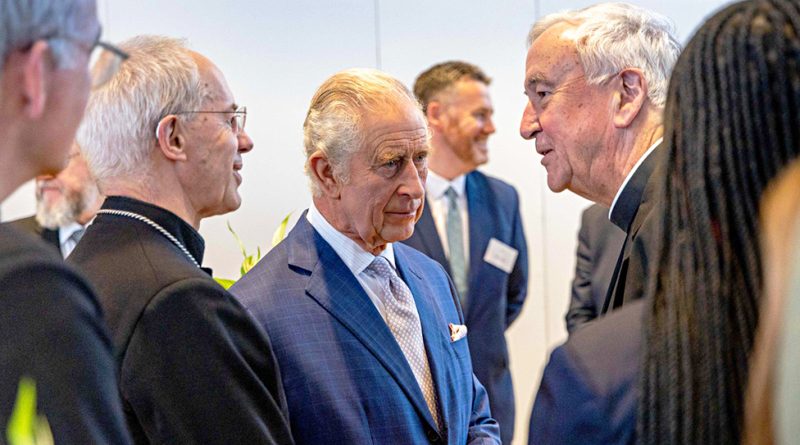King meets faith leaders at Lambeth Palace Library to mark Inter Faith Week
On Thursday 16th November, faith leaders from across the UK gathered to meet King Charles in the Library at Lambeth Palace to mark Inter Faith Week.
Speaking of the importance of the occasion, Cardinal Vincent said: ‘At a time of heightened community tensions, with fear, anger and protest all too evident, this was an important gathering, expressing His Majesty’s deep commitment to the harmony and well-being of all people in this land.
‘I was privileged to be there and to engage in significant conversations with other leaders. Calm is needed. Times to listen to each other are important.
‘Perhaps this can be done when together we fashion projects and take practical steps to help those most in need. And prayers for peace. Always.’
During his visit the King also viewed religious books and manuscripts in the library’s collection.
The King met librarians, conservators, and archivists, who had prepared a display that included a 16th-century Qur’an, a 15th-century Arabic edition of the Pentateuch (the first five books of the Old Testament), and the Bomberg Talmud, made in Venice in the early 1500s, which combines the original Aramaic text with commentary in Hebrew.
Asking questions about the conservation of the items in the collection, he expressed his hope that being exposed to natural light for his visit wouldn’t do any damage — and was assured that no harm would befall the books.
The First Church Estates Commissioner, Alan Smith, showed the King some of the items that informed the Church of England Commissioners’ decision to launch a £100 million impact-investment fund to benefit communities affected by the transatlantic slave trade.
Archbishop Welby told the King that what is known as the “Letter from the Unknown Slave”, sent in 1723 to the Archbishop at the time, and which went unanswered, had “a profound effect” on the project.
Afterwards, at a reception for faith leaders on the top floor of the library building, Bhai Sahib Mohinder Singh Ahluwalia presented the King with a copy of the Peace Charter for Forgiveness and Reconciliation, in the form of a scroll.
The document was developed by an international group of faith leaders and academics.
Speaking afterwards, Bhai Sahib, who is head of the Sikh charitable organisation Guru Nanak Nishkam Sewak Jatha, said that, in a world in which “wars are raging and people are being killed”, the message of peace was more important than ever — and forgiveness, and faith, were key.
“To have sustainable peace you to have forgiveness,” he said, and that faith acted as a bulwark against “hopelessness”. This was why religious education was vital, he said, adding that in their conversation the King had agreed that it was important for children to learn the values enshrined in faith traditions.
The Chief Rabbi, Sir Ephraim Mirvis, the Archbishop of Westminster, Cardinal Vincent Nichols, and representatives from the organising committee of Interfaith Week were also present at the event.
After the visit, Archbishop Welby said: “These are challenging times for faith communities in the UK, particularly with the ongoing war in the Middle East.
“Today’s visit by the King was a wonderful encouragement to remain united in partnership and friendship — as many people of faith are doing across the country.”
Pic courtesy Neil Turner, Lambeth Palace

